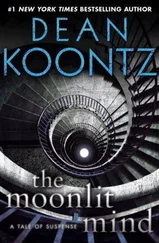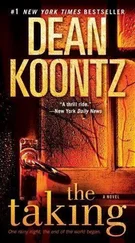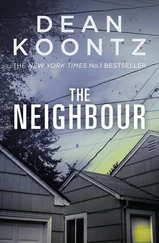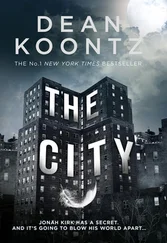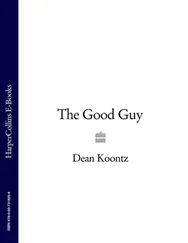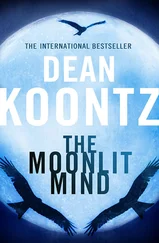Oddly, the smell stayed with him all the way back to the battery room, where, of course, it still hung on the damp musty air.
He didn't have time for a really thorough inspection of the equipment, but he wanted to give it a quick once-over to be sure the mice had died before they had done any serious damage.
The wires and cables were lilitly nibbled in a few places, but there didn't seem to be any reason to worry that they'd lose their lights to rodent sabotage.
He had almost satisfied himself as to the system's integrity when he heard a strange, threatening noise behind him.
51
The day was melting into darkness. Color was seeping out of the landscape through which they drove, leaving the trees and hills and everything else as gray as the surface of the highway.
Kyle Barlowe switched on the headlights and hunched over the steering wheel of the Oldsmobile, grinning.
Now. Now they had something real to go on. Now they had a solid lead.
Information. A logical plan. They weren't just going on a hunch and a prayer any more. They were no longer driving blind, heading north merely because it seemed like a good idea.
They knew where the boy was, where he must be. Now they had a destination, and now Barlowe was beginning to believe in Mother Grace's leadership again.
She was in the seat beside him, slumped against the door, briefly lost in one of those short but mile-deep sleeps that came to her with decreasing frequency. Good. She needed her rest.
The confrontation was coming. The showdown. When they were face to face with the devil, she would need all the energy she could muster.
And if Grace wasn't God's messenger, why had this vital information been conveyed to them? This proved she was right, meant well, told the truth, and should be obeyed.
For the moment his doubts had receded.
Barlowe looked in the rearview mirror. The two vans were still behind him. Crusaders. Crusaders on wheels instead of horseback.
52
When Charlie heard the strange noises behind him, he dropped into a defensive crouch as he turned. He expected to see Grace Spivey standing in the doorway to the battery room, but the disturbance had no human source. It was a rat.
The filthy thing was between him and the doorway, but he was sure it hadn't come in from the snow because part of what he had heard was the thump it made as it scurried out from under some machinery. It was hissing, squeaking, glaring at him with bloody eyes, as if threatening to prevent his escape.
It was a damned big rat, but in spite of its size, which indicated that it had once been well fed, it didn't look healthy now.
Its pelt wasn't smooth, but oily and matted and dull. There was something dark and crusted at its ears, probably blood, and there was bloody foam dripping from its mouth. It had been the poison. Now, pain-wracked and delirious, it might be a bold and vicious opponent.
And there was another, even less pleasant possibility to consider. Maybe it hadn't been the poison. Maybe the foam at its mouth was an indication of rabies. Could rodents carry rabies just as easily as dogs and cats? Every year in the California mountains, the state's vector control officers turned up a few rabid animals. Sometimes, portions of state parks were even put off limits until it could be ascertained whether there was a rabies epidemic.
This rat was most likely affected by the poison, not rabies.
But if he was wrong, and if the rat bit him.
He wished he had brought the shovel back into the battery room after disposing of the three dead mice. He had no weapon except his revolver, and that was too powerful for this small job, like going hunting for pheasant with a cannon.
He straightened up from his crouch, and his movement agitated the rat.
It came at him.
He jumped back against the wall.
It was coming fast, screeching. If it ran up his legHe kicked, catching it squarely with the reinforced toe of his boot. The kick threw it across the room, and it struck the wall, shrieking, and dropped to the floor on its back.
Charlie reached the door and was through it before the rat got on its feet. He climbed the stairs, picked up the shovel that was leaning against the base of the mill, and went back down.
The rat was just inside the open door to the battery room. It was making a continuous racket, a wailing-hissing-whining noise that Charlie found bone-chilling. It rushed him again.
He swung the shovel like a mallet, struck the rat, again, a third time, until it stopped making noise, then looked at it, saw it quivering, struck it again, harder, and then it was still and silent, obviously dead, and he slowly lowered the shovel, breathing hard.
How could a rat that size have gotten into the closed battery room?
Mice, yes, that was understandable, because mice needed only the smallest chink or crevice to get inside. But this rat was bigger than a dozen mice; it would require a hole at least three or four inches in diameter, and because the ceiling of the small room was of reinforced concrete, the walls of cinder block and mortar, there was no way the beast could have chewed open an entrance.
And the door to the room was metal, inviolable and unviolated.
Could it have been locked in this past autumn, when the last vacationers closed up the place, or when the real estate management firm had come up to "winterize" the cabin? No. It would have eaten the poison bait and would have been dead months ago. It had been poisoned recently; therefore, it had only recently gotten into the battery room.
He circled the chamber, searching for the rat's passage, but all he found were a couple of small chinks in the mortar where a mouse-but never anything larger-might have squirmed through after first gaining access to the air space between the double-thick block walls.
It was a mystery, and as he stood staring at the dead rat, he had the creepy feeling that the brief and violent encounter between him and this disgusting creature was more than it appeared to be, that it meant something, that the rat was a symbol of something. Of course, he had grown up with the terror of rats, which had infested the shack in which he had spent his childhood, so they would always have a powerful effect on him.
And he couldn't help thinking of old horror comics and horror movies in which there'd been scenes in ancient graveyards with rats skulking about. Death. That's what rats usually symbolized.
Death, decay, the revenge of the tomb. So maybe this was an omen. Maybe it was a warning that death-in the form of Grace Spivey-was going to come after them up here on the mountain, a warning to be prepared.
He shook himself. No. He was letting his imagination run away with him. Like in his office, on Monday, when he'd looked at Joey and thought he had seen only a bare skull where the boy's face should have been. That had been imagination-and this, too. He didn't believe in such things as omens. Death wouldn't find them here. Grace Spivey wouldn't discover where they had gone. Couldn't. Not in a thousand years.
Joey was not going to die.
The boy was safe.
They were all safe.
Christine didn't want to leave Joey alone in the cabin while she and Charlie returned to the Jeep for more of their supplies. She knew Grace Spivey wasn't near. She knew the cabin was safe, that nothing would happen in the short time she was gone. Nevertheless, she was terrified that they would find her little boy dead when they got back.
But Charlie couldn't carry everything by himself; it was wrong of her to expect him to do it. And Joey couldn't come along because he would slow them down too much now that the last of the daylight was rapidly fading and the storm was getting dangerously fierce. She had to go, and Joey had to stay. No choice.
Читать дальше

